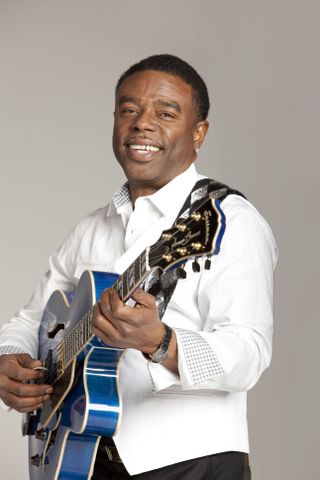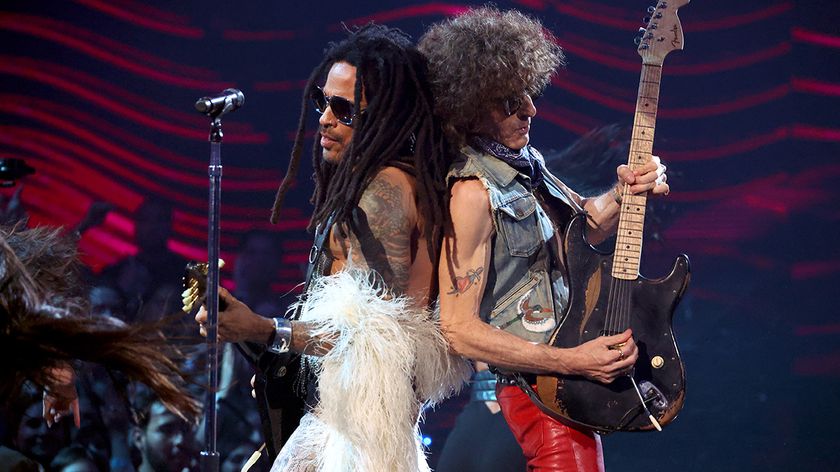'Human Nature': BWB Guitarist Norman Brown Discusses New Album Paying Homage to Michael Jackson

With an incredible catalog of songs accumulated over the course of a lifetime, Michael Jackson’s music was something that transcended genres and influenced a generation of listeners.
Growing up, I remember not only being glued to the TV watching the Jackson 5's cartoon, but also being on the front lines for the Thriller and Bad album phenomena (The former still ranks as the biggest selling album of all time).
People just couldn’t get enough of Jackson's music — and many a child of the '80s will tell you that they regularly (and secretly) paid homage to Jackson by imitating his moonwalk or wearing jackets and gloves similar to the ones he made famous.
Grammy-winning jazz guitarist Norman Brown never had the opportunity to meet the King of Pop, but his work on the new BWB album, Human Nature, channels the connection between Jackson and his music in a powerful way.
Fans have lamented that more than a decade has passed since Brown and BWB (with fellow jazz greats Kirk Whalum on sax and Rick Braun on trumpet) released their last album, Groovin. With Human Nature, not only has the supergroup reunited, but the reunion has allowed them to put their own spin on 11 Jackson classics, including tasty renditions of “Billie Jean," “Beat It” and “Man in The Mirror."
I had the pleasure of speaking with Brown and discussing Human Nature and more in this exclusive interview.
GUITAR WORLD: When you think of Michael Jackson’s music and legacy, what are some of the things that come to mind?
Get The Pick Newsletter
All the latest guitar news, interviews, lessons, reviews, deals and more, direct to your inbox!
I remember being real young and had just started getting into guitar. I was fairly good at the time, and when Michael came on the scene, I said, “Oh man, now I have to learn how to sing and dance too?” [laughs]. He just blew my mind. He truly was one of a kind.
What made you, Rick and Kirk decide to reunite and make this album?
We made our first BWB record together back in 2002, and ever since then, everywhere we go fans have been asking when we were going to do another one. So last year, the three of us got together and decided that it was finally time to do something. Rick was the one who came up with idea of doing a tribute to Michael, and for us it was a no-brainer.
How did you decide which songs to use from Jackson’s catalog?
We started off with a list of about 30 songs, then we narrowed it down to 20. We actually had a few extras in there too because we couldn’t make up our minds [laughs]. We finally were able to get it down to 11.
As a jazz guitarist, was there a lot of preparation required in terms of how to approach these songs?
There was a lot of listening involved. First, finding the favorites and then finding things that worked for this kind of instrumentation (guitar, trumpet and sax). All of the music has jazz elements with melodies that really sing on their own, without the lyric. In a lot of lyric songs, the melody can be so plain for an instrumentalist (because the actual words take over), but the songs we chose really lend themselves well to melodic ideas.
Tell me a little about your background.
I grew up in Kansas City, Kansas. It was a great place to live because within a six-block radius there was nothing but musicians. I remember the family across the street from me had seven people, and six of them played instruments. Then there was a drummer down the street, and another family had three people who played. At my house, me and my brother both played. Growing up, I played in a few neighborhood bands, but I really started playing guitar formally in high school as part of the jazz band. From there, I graduated and went to GIT and taught there for 12 years until I got my deal with Motown.
Did you have a practice regimen?
I did a lot of technique exercises. I learned how to play chromatics up and down the neck. That way, you’re able to work all four fingers, hit every note on the neck and get the right hand going as well. The right hand is the biggest challenge for guitarists because it’s similar to the way wind is for a horn player. A horn player blows into the sax and moves their fingers, but they get that sound from the wind. Since we as guitarists don’t have that luxury, the right hand has to become the wind.
What elements make for a great jazz guitar solo?
It’s all about personal expression. You have to have a good musical vocabulary, with enough technique and “colors” within that technique. Then you put all of that together and try to express yourself in a way that touches someone and moves them.
You grew up listening to players like Jimi Hendrix but eventually decided to focus more on jazz. How did that happen?
I actually did start out with Jimi and learning all of his stuff. But once my father saw that I was serious, he took me down to the basement and said, “Now you need to listen to this guitar player!” Then he put on Wes Montgomery, and man, it was an expansion for me. Wes had all of these great elements that I wanted in my own playing. And then George [Benson] came along and he took it a little further with his skatting and lightning-fast licks, and that was it for me! [laughs].
Human Nature will be released June 18. For more on Norman Brown and BWB, check out Brown's Facebook page.
Photo: Lori StollJames Wood is a writer, musician and self-proclaimed metalhead who maintains his own website, GoJimmyGo.net. His articles and interviews are written on a variety of topics with passion and humor. You can follow him on Twitter @JimEWood.




James is a guitarist and freelance writer who's interviewed some of the biggest names in music. He is the author of four books and his writing credits include work for Guitar World, AXS and Yahoo! as well as for his hometown newspaper where he writes on a variety of topics with both passion and humor. As a guitarist, he's performed everywhere from local bars and nightclubs to some of the biggest stages in front of thousands of music fans.

“We had 15 minutes left, and it was time to go… I just started playing that riff. Then Lenny goes, ‘Whoa, what’s that?’” Lenny Kravitz guitarist Craig Ross reveals the serendipitous roots of a Kravitz classic

“The concept of the guitar duel at the end was just appalling”: Crossroads is an essential piece of '80s guitar lore, but not every guitar legend was a fan of the film








